China Meets the World (5) ---- Scholar Vision
by Kong Shiu Loon 江紹倫
Unyielding Dedication
With an extensive, continuous history, a splendid culture and lasting wisdom, and now, a population totalling a quarter of mankind, China has a wealth of human potentials envied by all nations. Unfortunately, this potent force was systematically abused and negated in a repeated social-political movement of class struggle. It was a mad movement which must “persist forever” according to Mao Tse Dong, a belief doomed to fail, as defined by its very process. It contained the Chinese people for 30 years and instilled hatred in a land where the traditional value of love and harmony prevailed.
Class struggle is an imported concept, and a social divide. As long as some one or group uses either persuasion or power to put people into political categories, and force them to struggle against one another, there will be no peace of mind for individuals and community. Today, as we review how such a simple mistake could be made in a country for such an extended period of time, we can only conclude that it was done with a twist of education, using it to fool people instead of enlightening them.
No one was spared in that maddening process. No one gained either, not even those who were given special privileges, material, political, or otherwise. Fortunately, it ended with an awakening for reform and opening, beginning in 1980. Henceforth, basic human nature is recognized again, and the right for everyone to manage his/her own life is respected. Again, as we look back to how this new awakening could have happened, we should give credit to the many people who had carried the fine cultural legacy of our ancestors, that of decency, wisdom, optimism and love.
 I met a few of these people during my first visit to what was called New China in 1973. I was deeply touched by what they said, reflecting on their past obligations to a country that was shamed by ignorance and submission to foreign invasion, and their optimistic outlook for a positive future. Their experience is real history. It must be recognized and learned if we hope to fare better in a vastly changing world.
I met a few of these people during my first visit to what was called New China in 1973. I was deeply touched by what they said, reflecting on their past obligations to a country that was shamed by ignorance and submission to foreign invasion, and their optimistic outlook for a positive future. Their experience is real history. It must be recognized and learned if we hope to fare better in a vastly changing world.
All these scholars were well educated in the Chinese tradition. They also had rich and notable experiences in universities outside of China when they were young. All of them had accepted a restricted life, being bound to their duties and obligations. They had resolved to their present conditions of life because they chose to stay in the motherland. They were all confident that positive change would follow if they persisted with their own work. At the time when we met, they have been kept out of touch from the outside world for decades. However, their past actions and accomplishments had linked China to the rest of the world, like a network of permanent bridges. They have clear visions on future promises for their motherland. I had become a source of information on what things were like in the outside world, though our conversations must necessarily be limited.
Working with Reality
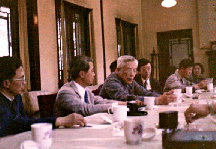 Zhou Pei Yuan 周培源 received our delegation at Beijing University in his role of Administrative President of the university. After the formalities and greetings he and I had a brief moment walking around a section of the campus in private, when I brought greetings from my own Vice Chancellor, C.M. Li, his friend in San Francisco. I met him again in 1978, as we planned together on reviving the universities, and explored the possibility of obtaining external assistance to gear them into new paths.
Zhou Pei Yuan 周培源 received our delegation at Beijing University in his role of Administrative President of the university. After the formalities and greetings he and I had a brief moment walking around a section of the campus in private, when I brought greetings from my own Vice Chancellor, C.M. Li, his friend in San Francisco. I met him again in 1978, as we planned together on reviving the universities, and explored the possibility of obtaining external assistance to gear them into new paths.
He had graduate degrees from Chicago and Caltech in 1927-28, and worked with Albert Einstein at the Institutive for Advanced Studies at Princeton University. He specialized in devising experimental tests for Einstein’s Theory of Gravitation. Later, during 1943-47, he did research for the US Navy, developing torpedo launching systems from aircrafts. He returned to China in 1949. Born in 1902, he had seen intellectual glories, and experienced physical and human calamities of war and peace in the 70 years before we met. He was alert and concerned. He has been kept as a symbol of high scholarship since 1949.
We avoided talking about Beida 北大, because the students and professors had been sent to the countryside to learn from poor peasants. It would be an embarrassing topic. He told me that research was being done developing artificial insulin. I told him that, at my home university, the little house where Banting and Best first discovered insulin is still kept as a laboratory. Then, we became personal and friendly.
I told him I had spent three months at Princeton with Carl Rogers working to fuse Daoist wisdom with non-formal counselling, and I enjoyed the congenial atmosphere hugely. He said the best time he had with Einstein was listening to his fortnightly violin recitals, especially when he played Bach.
“That’s what a university is about,” I said, “helping young people to nurture their mind and spirit. Knowledge and skills would follow as a by-product, bearing meaning.”
“It is true. Both Chicago and Princeton are like that.” he reminiscenced and added, “Some of our professors here had tried to help students develop their personalities. But they are members of collectives first. It takes a quiet and stable environment for young people to discover themselves, and be unique persons. We will have that one day.”
“I thought you were very scientific and technological?”
“Yes, but not very. I used to spend much time in music and poetry, just like many of my peers and professors. When I do that, the scientific conjectures become clear and easy.”
“Modern psychology calls that the process of opening the mind.”
He then asked me about the educational changes in America in the past 30 years. I told him that high school education had become universal in the 1970s, and about half of the university-age youths are engaged in higher education in various strands. Education has become the largest social institution and, of all the courses offered in the universities, social sciences studies are taking a large share, constituting about half of all university courses. The other 50% are shared by the arts and the sciences.
He was silent for a while. Then, as we said goodbye, he mumbled: “That is a lot of change. We have much to do catching up. We will catch up”
Philosophy vs. Wisdom
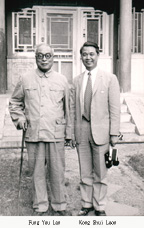 I had a brief conversation with Fung You Lan 馮友蘭, China’s eminent philosopher, at the university dinner banquette. We began talking about his time at Columbia University where he obtained his Ph.D. in 1925. He told me about John Dewey who had influenced him to work on neo-Confucianism. He did his research while teaching at the University of Pennsylvania in 1946. I knew he was now being scorned at by scholars outside of China, for inserting Marxist-Leninist Theories into Chinese philosophy. I avoided the subject because I also knew he had to survive the Red Guards and their Great Commander.
I had a brief conversation with Fung You Lan 馮友蘭, China’s eminent philosopher, at the university dinner banquette. We began talking about his time at Columbia University where he obtained his Ph.D. in 1925. He told me about John Dewey who had influenced him to work on neo-Confucianism. He did his research while teaching at the University of Pennsylvania in 1946. I knew he was now being scorned at by scholars outside of China, for inserting Marxist-Leninist Theories into Chinese philosophy. I avoided the subject because I also knew he had to survive the Red Guards and their Great Commander.
Fung was born in December 1895. He graduated from Shanghai University and moved to teach in Peking University, before going abroad to do his graduate studies. He was already prominent with his dissertation “A Comparative Study of Life Ideals”. He is remembered, however, for the publication of “A History of Chinese Philosophy” in two volumes 中國哲學史, revised a number of times. I remember being fascinated by it when he pointed out that there was no philosophy in our culture, only wisdom, and that the term 哲學 was a Japanese translation.
So I asked him about the difference between philosophy and wisdom, and learned a new lesson.
“Philosophy, as professed by the Greeks, is derived from logic, and it works in analysis. On the other hand, wisdom comes from experience and intelligence, and it guides behaviour by tempering the mind and the heart” he answered matter-of-factly.
I was elated because that simple explanation opened a new world of understanding for me. I had always suspected that philosophy did not quite belong to China. It was an import. It serves to break things down while our traditional wisdom attempts to combine things to new meaningful wholes, culminating in harmony. Right at that moment, it dawned on me why the Cultural Revolution was so destructive, because it was motivated by an ideology of communism and perpetual class struggle. I realized that only a revival of our ancient wisdom would steer China back to the building of a healthy and harmonious society.
“Do you mean that philosophy is for discussion, debate and struggle, while wisdom guides people to achieve self-actualization and happiness?”
“You are right. That is a practical way of comparing the two. We had been struggling with one ideology after another for more than a century since they were brought into China. It is time for us to benefit from putting our traditional wisdom to practice.”
I visited Professor Fung a second time in 1981 when he was in hospital. He told me he still remembered our brief exchange. He was happy to revise his book again, dropping any mention of foreign ideologies. He died peacefully in November 1990 at the ripe age of 105.
Golden Years Wasted and Used
For many years since the establishment of the People’s Republic, Premier Zhou En Lai 周恩來had taken great pride in boasting about China’s Three Qians 三錢, symbol of intellectual resources. They include Qian Xue Sen, Qian San Qiang and Qian Wei Chang 錢學森, 錢三強, 錢偉長. In time, however, the proud boasting was muted because of embarrassing political events.
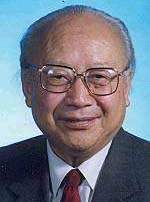 Dr. Qian Wei Chang was the most cheerful man I met in Beijing, though he had the least to cheer about. He was introduced to me at the Ministry of Education, bearing no official title. But I knew of him, especially the fact that he was a University of Toronto alumnus. He was also the nephew of Qian Mu 錢穆, President of New Asia College, Hong Kong, whom I knew well. Born in 1912, Dr. Qian entered Tsinghua University to study history. The Japanese invasion changed his mind to specialize in physics. Later, at the University of Toronto, he spent only 50 days to complete his Ph.D. thesis in 1940. The topic was on an aspect of the theory of flexible dynamics. Einstein learned about his accomplishment and invited him to do a postdoctoral program at Caltech. He did his work in jet propulsion under the supervision of Qian Xue Sen. Today, he is recognised for laying the foundation for the study of dynamics and mathematics in China, as well as an eminent educator and President of the Union of Democratic Societies 民盟.
Dr. Qian Wei Chang was the most cheerful man I met in Beijing, though he had the least to cheer about. He was introduced to me at the Ministry of Education, bearing no official title. But I knew of him, especially the fact that he was a University of Toronto alumnus. He was also the nephew of Qian Mu 錢穆, President of New Asia College, Hong Kong, whom I knew well. Born in 1912, Dr. Qian entered Tsinghua University to study history. The Japanese invasion changed his mind to specialize in physics. Later, at the University of Toronto, he spent only 50 days to complete his Ph.D. thesis in 1940. The topic was on an aspect of the theory of flexible dynamics. Einstein learned about his accomplishment and invited him to do a postdoctoral program at Caltech. He did his work in jet propulsion under the supervision of Qian Xue Sen. Today, he is recognised for laying the foundation for the study of dynamics and mathematics in China, as well as an eminent educator and President of the Union of Democratic Societies 民盟.
Back in China, Dr. Qian served as provost and vice President of Tsinghua University in the early 1950’s. Then, thunder struck. He was branded a rightist, and sent to work, as a labourer, at a steel mill for eight years. His children were barred from attending university. Why would a society run by Mao be so cruel to talented individuals? No one will know.
During a brief private moment, I conveyed to him the well wishes of his uncle and his alma mater. He was very candid and told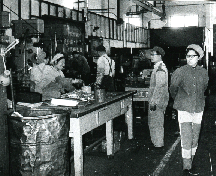 me how funny it was when he was sent to observe how peasants built water dams, using bamboo sticks and tree branches randomly piled together. They told him that his knowledge of dynamics was imperialistic and therefore of paper tiger quality. He then told me flatly, “My beloved motherland had compelled me to waste 20 golden years of my life.”
me how funny it was when he was sent to observe how peasants built water dams, using bamboo sticks and tree branches randomly piled together. They told him that his knowledge of dynamics was imperialistic and therefore of paper tiger quality. He then told me flatly, “My beloved motherland had compelled me to waste 20 golden years of my life.”
I visited him again in the summer of 1985. He was then the President of The Industrial University of Shanghai 上海工業大學, specially appointed by Deng Xiao Ping. He was full of vigour and aspirations, determined to innovate and make the university an open and effective institution. He asked me to give him as much suggestion as I could, and quoted his own slogan of “learning till old, working till old and living till old” 学到老, 做到老, 活到老, to show his determination.
I used the wisdom of a number of university presidents and educators to show him the nature and mission of universities. Abraham Flexner, who found the Institute of Advanced Studies at Princeton, once said: “The university must have as its weight and prestige the working of intelligence. If the university does not accept this challenge, what other institution can, or will?” A. N. Whitehead, the educational philosopher, added: “A university is imaginative or it is nothing – at least nothing very useful.” President of Cornell University James Perkins explained the dynamic nature of knowledge as “an interplay and tension connected with its acquisition, transmission and application. It is this interaction that shows the world what could be, rather than what is.” Dr. Qian was totally excited when I added that a university is not only about knowledge but, more important, about creativity and wisdom.
He initiated a program urging his professors to learn education and teaching methods, so they could teach effectively rather than just pass information. They must also set up office hours to receive students who chose to share their feelings and enquiries. He was appointed President of The University of Shanghai in 1993 at the age of 81. He did his job seriously for half a dozen years, until his health failed him. He was perhaps the oldest university president in history.
Man of Diverse Talents
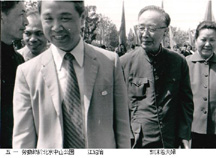 By my request, my host arranged a leisurely time for me to meet with Guo Moruo 郭沫若, poet, historian, writer, oracle bone script specialist, and promoter of vernacular literature, a legendary scholar. He was the First President of the University of Science and Technology of China 中國科技大學 established by the Academy of Science in 1976.
By my request, my host arranged a leisurely time for me to meet with Guo Moruo 郭沫若, poet, historian, writer, oracle bone script specialist, and promoter of vernacular literature, a legendary scholar. He was the First President of the University of Science and Technology of China 中國科技大學 established by the Academy of Science in 1976.
I began my admiration for him and his work since my elementary school days, when I read about his experience going to study in Japan. His diary was written in romantic style, giving beautiful narration of his feelings whenever he encountered new situations and persons. Later, he devoted much energy writing vernacular poems and translating Qu Yuan’s poems into vernacular style. Mao Tse Dong was one of his many admirers. He issued orders to save him from an extended barrage of attacks at the onset of the Cultural Revolution in 1966. However, that was not enough to prevent his two sons from committing suicide when their father and the whole family were under malicious attacks. He was accused for being an enemy of the people, from being of landlord class to being a traitor, because he had studied in Japan and married a Japanese woman who had born him five children.
Born in Szechuan in 1892, Guo’s parents were among a million Hakka immigrants who went there to explore new opportunities during the latter part of the Qing Dynasty. They did very well, and young Guo went to study medicine in the Imperial University of Jiu Zhou 九州帝國大學 in 1913, just when China changed from feudalistic rule into a modern era, with the establishment of the First Republic. Later, he came home to join Chiang Kai Shih in the Northern Expedition 北伐 to rid off the war loads from dividing China into zones of interest.
We had about an hour together watching the performances in celebration of May Day. I thanked him for his literary works of pure artistry, shy of any political ideology. He laughed, telling me that I might be accused of being blind, because he was facing accusations of being a court jester for Chairman Mao.
“But you are not a communist, as far as I know. And you are not a democrat either.” I offered my observation.
“The irony is that this non-political person is always seen as a political figure. For example, I chose to stay in China instead of going to Taiwan or overseas in 1949.”
“Could you tell me your reasons?’ I asked, seizing a rare opportunity.
“Simple. I am a historian, and history was being made here in the mainland. You must admit that the establishment of the People’s Republic was a milestone event in our time”.
“But history is an ongoing process. It is also important to judge what follows a milestone.”
“Still, in human terms, a child has no right to choose his own parents, but only to live with them as well as he could.”
I kept quiet for a moment, trying to decide if I should tell him that the world was now open and one, transcending space, if not time. I did not. Rather, I asked a different question: “Do you think Qu Yuan was right being loyal to his king at all cost?”
“He believed he was right. Who are we to judge when we are so far removed from the situation that he was in? To learn from history is not only to be aware of the facts; rather, we should be involved, to put ourselves in the circumstances, and try our best to do something to change. Qu Yuan had his struggles. He left to us a very valuable legacy of literature, expressing his mental processes and aspirations, exalting beauty.”
I thanked him for sharing a valuable and inspiring time together. I could not help thinking of the pains that he had born with the many personal losses he had suffered, including losing his sons in suicide.
Minorities and Sociology
 No new building was allowed in Tien On Men Square 天安門廣場 except an elaborate structure that was The Institute for Minorities Studies 民族學院. President Fei Xiao Tong 費孝通 received us there with a few professors on their colourful ethnic costumes. China has paid great attention to unite and harmonise the 73 minorities since the Qing Dynasty. It was done for reasons of national unity and security. The People’s Republic pays high respect to the same issues by establishing Autonomous Regions 自治區, with the status of provinces, so the largest minority groups can govern themselves. The central government had also set up research programs to foster understanding and development.
No new building was allowed in Tien On Men Square 天安門廣場 except an elaborate structure that was The Institute for Minorities Studies 民族學院. President Fei Xiao Tong 費孝通 received us there with a few professors on their colourful ethnic costumes. China has paid great attention to unite and harmonise the 73 minorities since the Qing Dynasty. It was done for reasons of national unity and security. The People’s Republic pays high respect to the same issues by establishing Autonomous Regions 自治區, with the status of provinces, so the largest minority groups can govern themselves. The central government had also set up research programs to foster understanding and development.
Born in 1910, Professor Fei was educated at Yanking University 燕京大學and later, at London University, where he completed a Ph.D. degree in 1938, specializing in rural studies. At home, his dissertation “Peasant Life in China” 江村經濟set the foundation for studies of sociology, anthropology and ethnicity in modern China. He studied ethnic groups and small towns in zest during the decades of 1930-40, and plunged himself into social movements, promoting democracy and patriotism. He was appointed Vice President of the Institute of Minorities Studies in 1952, as well as a People’s Representative. However, happy days were short. He was branded a rightist in 1958 and lost all his rights for being a bourgeoisie scholar.
He is an affable man, wearing a contagious smile meeting people, new acquaintances and old friends alike. At our meeting held in the huge sitting room of the Institute, he tactfully asked us to make suggestions to improve his work. He said: “Under the great leadership of Chairman Mao and the Communist Party, we have made great strikes in enhancing the interests of our minority brothers and sisters, respecting their traditions. Six of the largest minority groups have now developed written languages, based on their oral dialects. But we need to do more, and we need your suggestions.”
“Why is the study of sociology placed in your Institute alone, instead of in the universities as it should be?” asked a member of our delegation.
“Well, because our motherland regards serving the needs of the underprivileged a priority, and we should focus our limited resources in meeting these needs first.” He replied.
Sensing possible embarrassment, I changed the direction of our communication, and made an open invitation for Dr. Fei and his staff to visit us at their convenience. The fact is that communist governments are afraid to study human beings as free agents. They rather like to control them as members of collectives to follow authoritative commands. Thus, psychology and sociology were barred from education at any level.
I met Dr. Fei a second time in New York in 1988. It was a happy occasion as he was there to receive an award by City Council for his contribution to ethnic understanding. I had him visit the University of Toronto after the event, and showed him how the social sciences and humanities had become a significant part of undergraduate education. I also introduced to him the concept of Canadian multiculturalism which saw Canada as a country of cultural rainbow.
He was very impressed by the way the various provinces maintain their economic equity on the principle of national unity. In his final years, he presented the fact that other scholars had been loath to express. His new book, entitled “The Multiplicity and Unity Characteristics of the Chinese People” 中華民族多元一體格局, dispelled the belief that the Chinese people are Hans whose ancestors were from a single ethnic origin.
A Poet Mathematician
Among China’s key universities, Fu Dan University 復旦大學 has perhaps the most interesting history. It began in 1905,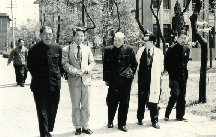 combining a number of private colleges to form a university. One of the colleges amalgamated was established by the Jesuits named Aurora College震旦大學. It was quite famous for the study of languages and literature. Its name, however, was too asserting, meaning dawn of quality education emerging from darkness. No hot-blooded Chinese would take that easily. Thus, the new university was called Fu Dan to mean Renewing Dawn.
combining a number of private colleges to form a university. One of the colleges amalgamated was established by the Jesuits named Aurora College震旦大學. It was quite famous for the study of languages and literature. Its name, however, was too asserting, meaning dawn of quality education emerging from darkness. No hot-blooded Chinese would take that easily. Thus, the new university was called Fu Dan to mean Renewing Dawn.
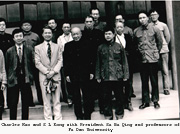 We were received by President Su Bu Qing 蘇步青and a number of senior professors, half of whom from worker’s class. Not a soul was seen in the huge campus. President Su is a legendary figure. He and Hua Lo Geng 華羅庚are considered the two most renowned mathematicians of modern China. He laid the foundation of mathematical research for China in the early 20 Century, and he was a university man all his life.
We were received by President Su Bu Qing 蘇步青and a number of senior professors, half of whom from worker’s class. Not a soul was seen in the huge campus. President Su is a legendary figure. He and Hua Lo Geng 華羅庚are considered the two most renowned mathematicians of modern China. He laid the foundation of mathematical research for China in the early 20 Century, and he was a university man all his life.
Born in 1902, he went to study at the Imperial University of Northeast Japan 東北帝國大學 to obtain his Ph.D. in 1931. He married a Japanese wife and had 11 children. His teaching career was mostly at Zhejiang and Fu Dan universities. But, he was also the Dean of Science of Taiwan University, when it was first established. He returned to the mainland in 1946. He became a Communist Party member in 1959, and held a number of important political positions thereafter. Like all intellectuals of his time, he was purged in 1972 and sent to work, as a labourer, at a shipping construction company for many years. While there he wrote many poems, including this one celebrating a hard time together with the famous cartoonist Feng Zhi Kai 豐子愷, expressing optimism for change.
Happy moments together we delight in sharing simple dishes
Fuel and rice worries will not make us complain of our distress
Vernal breezes are greening the grass in front of our door
Let us endure the remaining cold to see winter no more
草草杯盤共一歡
莫因柴米話辛酸
春風已綠門前草
且耐餘寒放眼看
He was very surprised when I recited two of his poems as we met. Later, when we had a private moment together walking to my waiting bus, he held my hand warmly to show his gratitude that people overseas were watching the plights of scholars in China.
Su Bu Qing held his position of President of Fu Dan until 1983 when he was 81 years old. He died in March 2003, at the ripe age of 101.
Bridge to Future
In recounting my encounters with the above great scholars, it is my hope that their shining characters, and their signal contributions to scholarship and motherland, will be remembered as examples of excellence and dedication. They are no longer with us now. They had lived and their strivings had covered the entire 20 Century, as China went through tumultuous change and suffering. She first broke out of feudal rule to connect with modernity, then engulfed in protracted wars with war lords and the Japanese invader, followed by a rigorous civil war. Then, towards the second half of the century, just as hints of liberation and self-determination were celebrated, with sprightly expectations for stability and progress, the country staggered into a vile course of class struggle, personal mistrust, and self-deceit, sparing no one.
Towards the end of the century, however, it was fortunate that knowledge and reason triumphed over selfishness and foolishness to propel China into a new course of openness and reform. Hopefully, this new approach for global engagement will enable China to meet the world on mutually respectful terms, as mankind advances into the new millennium. In retrospect, if the 20 Century was a time of huge change, then the changes experienced by the Chinese people have been deeper and more extensive than any other people had gone through. They were not material and organizational changes. Rather, they involved changes in basic human relationships and personal dignity, reducing individuals to passive existence and despair.
Today, as China attempts to meet the world on equal and mutually respectful terms, her driving force can be built on the foundations of tradition and achievements of numerous individuals who had been bridges to the future. They are brilliant, determined, creative and dedicated individuals, just as the ones described in the various parts of this China Meets the World article.
It has been said that history needs heroes. That is for vanity. If the purpose of history is to inspire people to learn to surpass the past, then it needs role models. The life and accomplishments of every person introduced above qualify him or her to be a role model. They are true patriots and the best examples of our cultural heritage. When combined with many other personalities like them, and their experiences presented fully, these role models should constitute the best learning material for future generations.
The 21 Century is a reality marked by discontinuity, information overload, techno-economic supremacy, and a lack of privacy and inner peace. A new collective is being formed on a global scale. It combines the forces of technology, consumerism, and unguarded greed to strip individuals of basic rights and freedoms for self-determination and creative life. The content and rate of change will continue to accelerate until human beings are lost in the process.
We need a break before attempting to achieve new breakthroughs. The best breaks will be those spent in the appreciation of worthy role models who connect a glorious past to a greater future. Long ago, Zhuangzi 莊子wrote a story to show when a person (or society) attempts to carve a piece of wood into a useful axe handle, the best example is in his own hands. Today, our children will do best to learn from our rich tradition when they look for new models for what they attempt to make.


